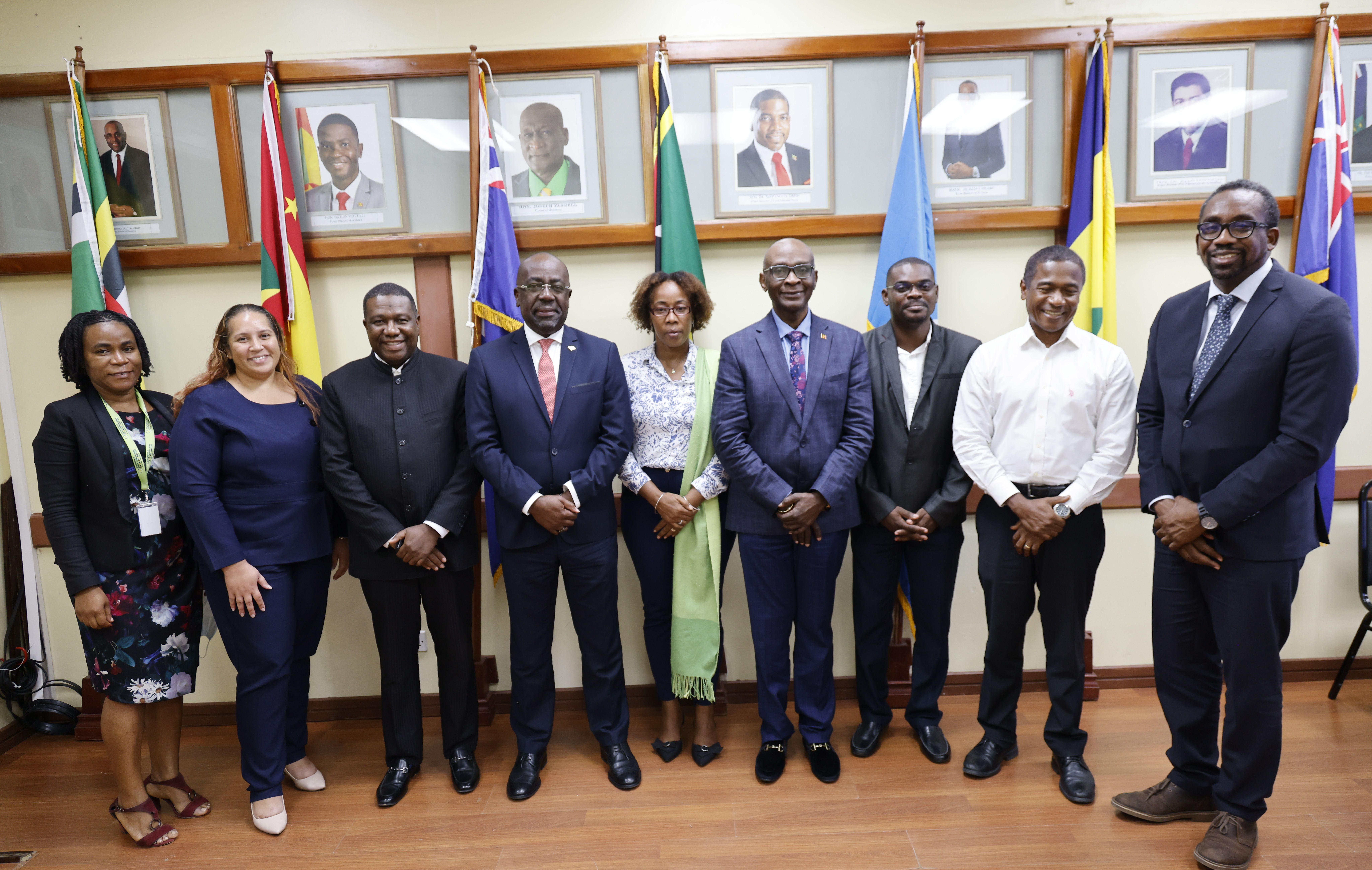OECS Council of Ministers for Trade Concludes Fifth Ordinary Meeting
OECS Media Release
The Fifth Ordinary Meeting of the OECS Council of Ministers for Trade was successfully concluded on May 23, 2023 in Saint Lucia. The meeting was held in a hybrid format, with some ministers attending in person and others participating via videoconference.
The meeting focused on four main areas:
- OECS engagement at the World Trade Organization (WTO)
- Enforcement of Competition in the OECS
- Implementation of the OECS Customs Union
- Trade for Development in the OECS
In addressing the meeting, Director General of the OECS Dr. Didacus Jules reminded the Ministers of ‘’the critical importance of Trade to the economies of the OECS. He noted the challenges facing the OECS, including the war in Ukraine, the evolving international geopolitical dynamics, and the continued unequal realities of trade within the CARICOM region.’’ He also noted that the OECS "relies strongly on the solidarity of the Council of Ministers of Trade."
The Honourable Everly Paul Chet Greene, Minister for Foreign Affairs, Agriculture, Trade & Barbuda Affairs of Antigua and Barbuda and Chair of the Council, recalled the important decisions taken at the Fourth Meeting in November 2022 to strengthen the coordination and harmonization of Trade Policy in the OECS. According to him, "full realization of these decisions will improve the coordinating and consultative capacity of the OECS to bring sound analysis and recommendations to the Council for decision making." He also underscored the importance of consolidating and advancing regional integration with the operationalisation of the Economic Union and the single economic and financial space including the implementation of the Customs Union with free circulation of goods.
OECS Engagement at the World Trade Organisation (WTO)
On the engagement at the WTO, the Ministers expressed satisfaction with the success of the Fourth Trade Policy Review of the OECS at the WTO, which was held on May 3 and 5, 2023. They also commended the performance of the OECS Geneva Mission team.
The Ministers discussed the negotiations to reform the WTO Dispute Settlement Mechanism. They recalled the significant challenges of small developing countries in accessing the dispute settlement mechanism and in securing meaningful compliance with favourable rulings. They agreed that the OECS will continue to engage actively and constructively in the negotiations.
The Ministers also agreed to the immediate establishment and operationalization of the Quick Consult Mechanism (QCM) in order to enhance OECS negotiating effectiveness at the international level.
Enforcement of Competition in the OECS
On Competition, the Ministers received a comprehensive presentation on the importance of establishing the policy, legislative, regulatory and institutional framework for enforcing fair competition in the CARICOM and OECS.
The Ministers took note of the status of the implementation the Community Competition Policy in CARICOM and the fact that a common competition policy has not been agreed within the OECS. They also recognised the need for greater advocacy and visibility on the issue in the OECS including the role and work of the CARICOM Component Commission.
The Ministers agreed to the adoption of the Community Competition Policy of CARICOM as the OECS Common Competition Policy and to advance work towards implementing competition law enforcement in the OECS.
Implementation of the OECS Customs Union
On the Customs Union, the Ministers took note of the status of work being done under the main components for operationalising the OECS Customs Union, including the free circulation of goods regime. This includes harmonizing the OECS Border Structure with a common customs tariff and harmonised non-tariff taxes and charges and harmonizing the OECS Border Management Systems though common standard operating procedures among the participating Member States.
The Council also took note of the progress on establishing the legislative and regulatory framework for the OECS Customs Union which includes adoption and enactment of 5 draft harmonised bills on Animal Health, Plant Protection, Food Safety, Standards and Customs in the OECS.
Ministers made several key recommendations to the OECS Authority to advance the work and urged Member States to undertake the necessary national consultations with all relevant stakeholders and to engage fully in the regional consultations on the harmonisation of the tax structure and the border management system.
Trade for Development in the OECS
On Trade for development, the Ministers considered the issue of improving the monitoring and review of OECS external trade performance. They noted the importance of access to up to date and accurate trade data and statistics for good evidence-based policy making. The Ministers also noted the findings from a very preliminary analysis of the performance of the OECS merchandise trade for the past ten years in which exports have been stable but trending downward for the last five years; exports have remained narrow in composition and destination; and imports have been significantly outstripping exports resulting in a very wide trade deficit.
The Ministers agreed to agreed to improve the collection and dissemination of Trade data and to identify and address the challenges and capacity limitations to doing so and to continually assess Trade performance to inform the formulation of Trade policy.
The Council also received and noted the presentations on the work of the OECS Commission Competitive Business Unit to enhance the Trade competitiveness of the OECS. This included a preliminary report on the OECS Virtual Exposition held on May 15 – 17 and a number of initiatives aimed at MSME and export development.
The Ministers expressed satisfaction with the outcome of the meeting and agreed to continue to work together to advance the trade agenda of the OECS.





